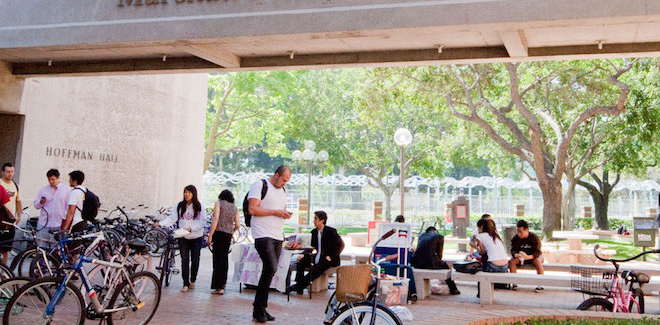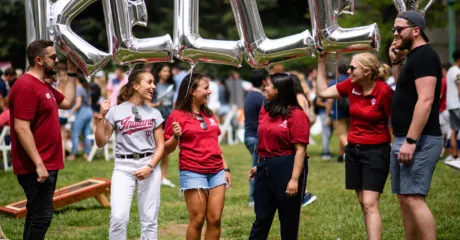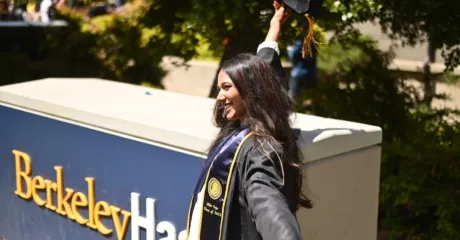The University of Southern California’s Marshall School of Business earned a very impressive silver medal in this year’s 2023 rankings, landing at No 2. – down only one place from last year when they took home the gold at No. 1 in last year’s 2022 rankings.
Marshall offers a high quality business education that is characterized by experiential learning opportunities. Of the three methodological categories, Marshall placed highest in Admissions, where they came in 2nd for the second time in a row. They placed 7th in Career Outcomes and 6th in Academic Experience.
Marshall’s average SAT score for the most recent incoming class was 1478 – just under last year’s average at 1480. The B-school had an even more selective acceptance rate for incoming students at 7.20% – a touch more selective than last year’s 9.03%.
INTERNSHIPS AND EMPLOYMENT OUTCOMES
Both internship and employment outcomes for Marshall graduates were especially strong this year. Internship rates were down from last year’s 100% for the Class of 2022, but not by very much – with 92.20% of the Class of 2023 securing an internship before graduation. As for employment, the B-school saw successful outcomes similar to last year — with 95.40% of the Class of 2023 landing a full-time position within three months after graduation, as compared to 97.81% for last year’s Class. The reported average starting salary was the 8th-highest of all ranked undergraduate business schools, coming in at an average of $93,247 for the Class of 2023.
For prospective MBAs, it’d be wise to become familiar with the way “breadth with depth” is used at Marshall. The school’s administrators use it to describe the idea of studying the appropriate amount of depth in a student’s specific area of interest. This is reflected in the curriculum by a commitment to liberal arts even for business students.
Within the business school, students choose from a business administration major or an accounting major. However, USC Marshall has one of the most unique degree programs in the World Bachelor in Business Program. A joint program more akin to an executive MBA than a bachelor’s degree in business, students spend for years studying at Marshall, HKUST Business School in Hong Kong, and Università Bocconi in Milan, Italy.
“The World Bachelor Program in particular touches on things like university processes, admissions, housing, and medical insurance,” Vice Dean of Undergraduate Programs at USC Marshall Tyrone Callahan told Poets&Quants in July 2021. “We had to make sure we considered every aspect of the program and what the student experience would be like. Through that, I was able to learn a lot about how the university works in different capacities in a way that most faculty members are unaware of.”
Incoming students have the opportunity to experience the state-of-the-art Jill and Frank Fertitta Hall. Before, the undergraduate population had been spread out among multiple buildings, but Fertitta Hall serves as a hub for undergraduates at Marshall.
“Within the business curriculum, students have a minimum of 24 free electives, and that’s enough to do pretty much every minor,” Callahan pointed out in his interview.
For more info about USC Marshall, see this exclusive interview with Tyrone Callahan. For an exclusive feature on the World Bachelors in Business program, click here.
Alumni say:
“One key experience was the Global Leadership Program (GLP), which enabled my peers and me to meet with distinguished professionals from various industries and learn from their experiences. Additionally, we learned about global business and embarked on a 10-day trip to China to see the principles applied in practice. This was a very impactful experience for me because it broadened my horizons and gave me diverse, practical exposure to the business world.”
“The international programs that Marshall provided allowed me to experience first hand all the possibilities that one can pursue in life. It put a spotlight on how there are boundless problems to solve and opportunities to seize that exist outside the confines of the conventional paths laid out for college educated Americans. This was important to me because it was a catalyst of inspiration for me to become a more passionate learner in my day to day life.”
“USC Marshall has the Experiential Learning Center (ELC) that was pivotal to my business education. The ELC placed us in real-world simulations and recorded our interactions for analysis to provide actionable improvements on how we handled actual scenarios with teammates.”
“I participated in the Undergraduate Student Investment Fund (USIF) in my senior year. As one of 16 students selected to manage a portion of the endowment, I was empowered by the guidance and trust of Marshall’s faculty in managing over $3 million of capital. USIF provided me with real-world investment experience with the safety net of an academic environment, simultaneously fostering academic, personal, and professional growth through a comprehensive program with active fund management, guest speakers from leading investment firms, a fund-sponsored trip to New York for experiential learning of the financial services industry, and a practical team learning environment with my peers.”
“I was a part of the GLP (global leadership program) as a Freshman. During Spring Break we traveled to Shanghai and Beijing to visit various companies and manufacturing settings to gain an understanding of global business. I have discussed this program in every interview I have ever had because it stands out to employers. Even working in the fashion industry has come up as a point of interest.”










